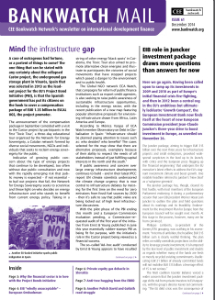Civil society aiming to clamp down on EIB tax haven evasiveness

Bankwatch Mail | 2 February 2015
Pressure is mounting on the European Investment Bank to take swift action that addresses weaknesses in its policy on lending to businesses based in tax havens.
This article is from Issue 61 of our quarterly newsletter Bankwatch Mail
Browse all articles on the right
Recent media investigations and a new report from European Network on Debt and Development (Eurodad) have thrown further light on the billions of euros provided by development finance institutions (DFIs), and intended for projects in developing countries, that are being routed through tax havens.
As Mathieu Vervynckt, Policy Analyst at Eurodad and author of the ‘Going Offshore‘ report, points out:
“Developing countries lose hundreds of billions of euros every year through tax avoidance and evasion by companies. It therefore seems very contradictory for DFIs – whose mandate is to promote development and end poverty – to route so much support through notoriously secretive financial centres that maintain these practices. In doing so, bilateral and multilateral DFIs are essentially providing income and legitimacy to the offshore industry.”
As well as assessing the tax haven proclivities of national level DFIs, the new Eurodad report examines the dealings of multilateral DFIs in the shadowy world of offshore jurisdictions. For the period 2009-2013, the International Finance Corporation – the World Bank’s private finance arm – extended EUR 1.7 billion in support to financial intermediaries registered in tax havens that feature in the top 20 jurisdictions listed under the Tax Justice Network’s Financial Secrecy Index.
Read more
EIB set to weaken transparency standards
Press release | January 27, 2015
Letter to EIB directors: EIB final draft of transparency policy is insufficient (pdf)
Advocacy letter | January 27, 2014
Eurodad research, however, drew a blank with the EIB: the ‘EU bank’ does not even disclose the countries where the companies it invests in are domiciled. “Due to the EIB’s lack of transparency about its operations,” explains the report, “it is very difficult to judge the extent of its support for companies that use tax havens.”
Indeed, lurking beneath the seemingly benign project descriptions and blandly named beneficiary entities that feature heavily in the EIB portfolio are some unpalatable ‘development’ realities.
One such case thrown up in a recent investigation by George Turner of the ‘Illicit Finance Journalism Programme’ spotlights the importance of hundreds of millions of euros in loans provided by the EIB for Qalaa, an African investment fund – a company Turner claims has been built on tax havens and that continues to be a heavy user of tax havens.
Rarely fond of acknowledging that its funds can, and often do, end up with tax haven incorporated entities, the EIB has made little effort in recent years to move beyond the limited set of international standards set up by the OECD Global Forum. For some years now the Forum’s criteria have guided EIB and other DFI decisions on investing in companies and funds registered in secretive jurisdictions – even if many developing countries in which the banks invest are not part of the Forum.
Despite the EIB having taken important steps back in 2009 to tighten up restrictions on investments reaching tax havens or ‘non-cooperative jurisdictions’, campaigners are concerned that the bank has dropped the ball in recent years and failed to keep up with wider European momentum aimed at clamping down on corporate tax evasion.
Counter Balance believes that the EIB can readily pull its socks up on tax matters and align itself with important advances in EU law by focusing on corporate transparency, and two essentials in particular.
In its assessment of potential clients, the EIB should insist on the disclosure of information that identifies the beneficial ownership of clients – that is, who ultimately owns, controls or benefits from a company or fund that receives EIB support? The second priority should be to introduce mandatory requirements for all clients to report on a country-by-country basis.
Tags: BW Mail 61 | tax havens | tax justice | transparency
Never miss an update
We expose the risks of international public finance and bring critical updates from the ground. We believe that the billions of public money should work for people and the environment.
STAY INFORMED
